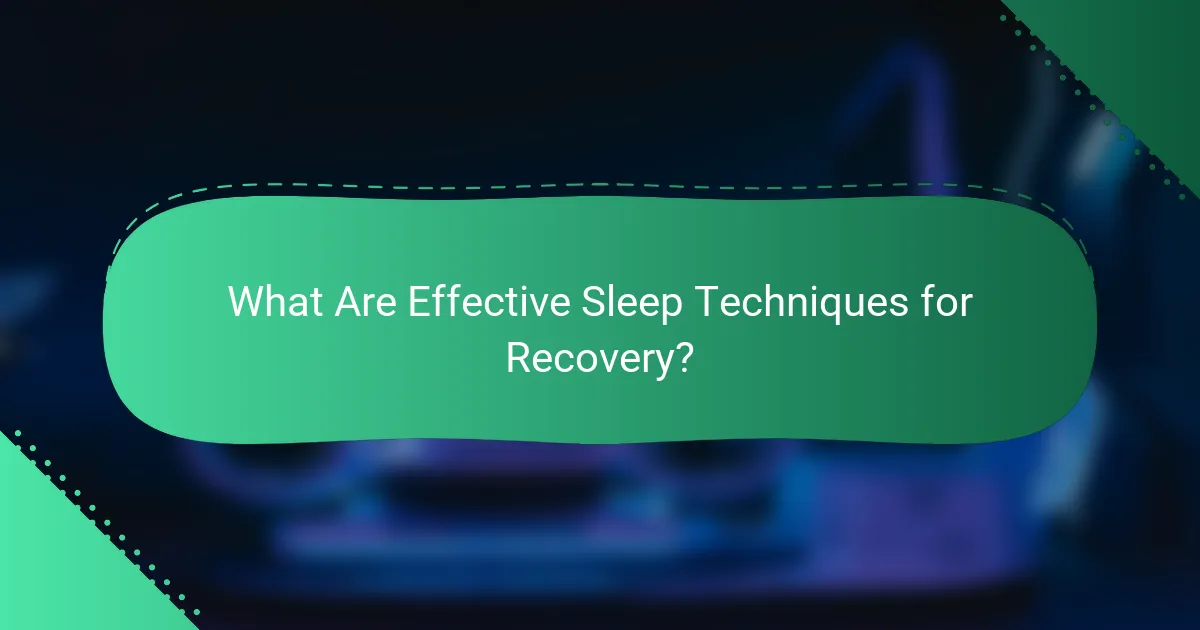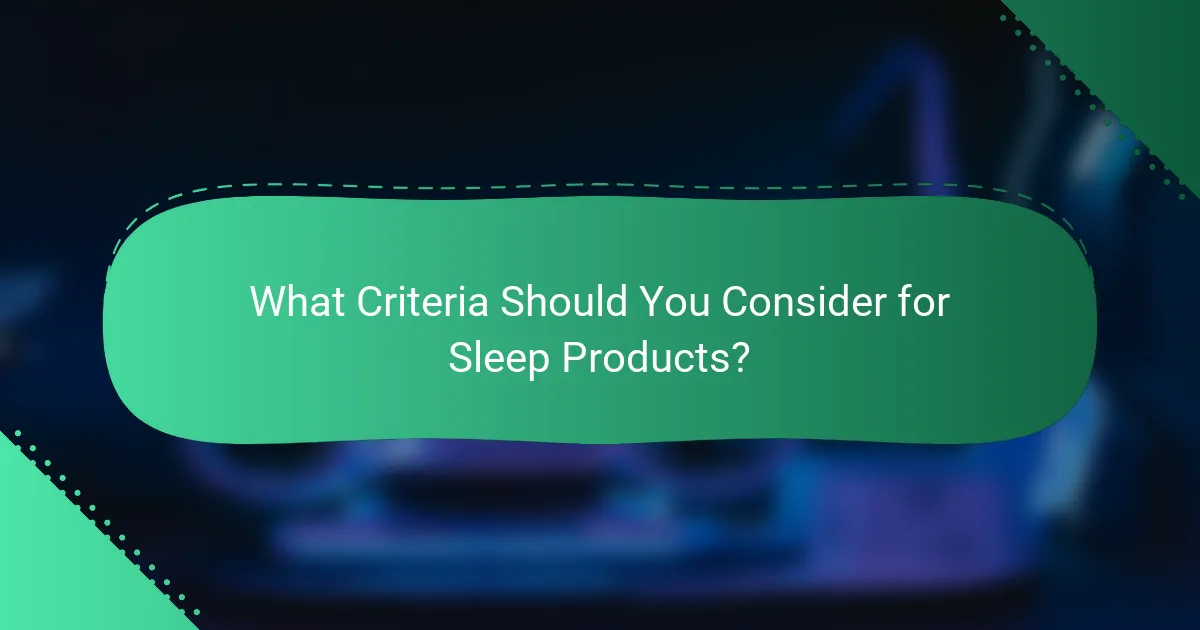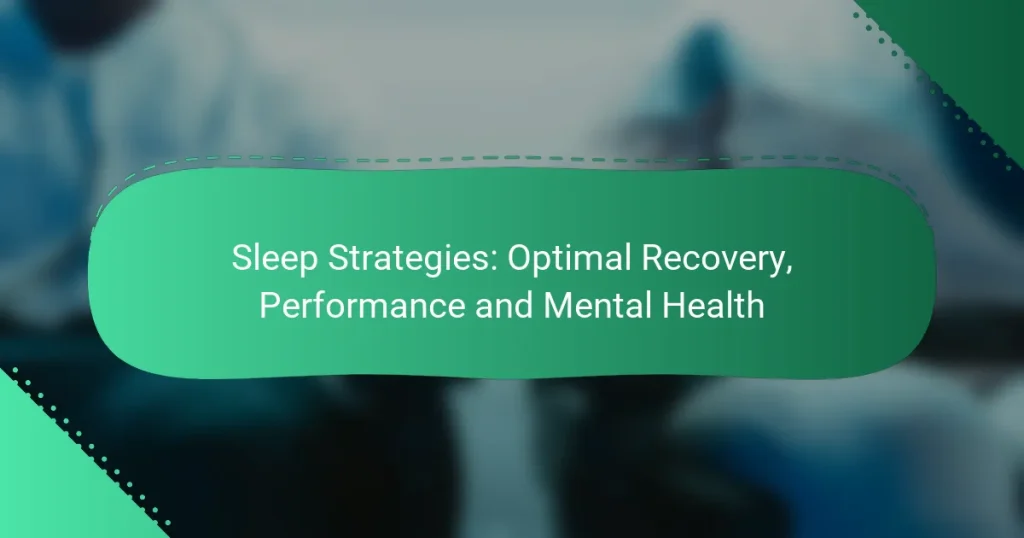Implementing effective sleep strategies is essential for optimizing recovery, enhancing performance, and supporting mental health. Prioritizing quality sleep not only improves cognitive function and physical endurance but also fosters emotional well-being, leading to greater productivity and resilience. By focusing on techniques that enhance sleep quality and duration, individuals can experience significant benefits in both their personal and professional lives.

How Can Sleep Strategies Improve Performance?
Implementing effective sleep strategies can significantly enhance performance across various domains, including cognitive function, physical endurance, and emotional well-being. Prioritizing quality sleep leads to better recovery, sharper focus, and improved overall productivity.
Enhanced cognitive function
Quality sleep is crucial for optimal cognitive function, as it facilitates memory consolidation and learning. During sleep, the brain processes information and strengthens neural connections, which can lead to improved problem-solving skills and creativity.
To maximize cognitive benefits, aim for 7 to 9 hours of sleep per night, and establish a consistent sleep schedule. Avoiding screens before bedtime can also enhance sleep quality, leading to sharper mental acuity during waking hours.
Increased physical endurance
Sleep plays a vital role in physical performance, particularly in endurance sports. Adequate rest allows muscles to recover and replenish energy stores, which can enhance stamina and reduce fatigue during workouts.
For athletes, incorporating naps or ensuring sufficient nightly sleep can lead to better training outcomes. Studies suggest that even small improvements in sleep duration can result in noticeable gains in endurance and overall athletic performance.
Better reaction times
Improved sleep quality directly correlates with faster reaction times, which is essential in many sports and activities. Sleep deprivation can lead to slower responses, increasing the risk of errors and accidents.
To maintain quick reflexes, prioritize sleep hygiene by creating a restful environment and avoiding stimulants before bed. Regularly tracking sleep patterns can help identify areas for improvement and enhance overall responsiveness.
Improved mood and motivation
Sleep significantly affects mood and motivation levels, with insufficient rest often leading to irritability and decreased enthusiasm. A well-rested individual is more likely to approach tasks with a positive mindset and greater determination.
To boost mood, consider incorporating relaxation techniques such as meditation or deep breathing exercises before sleep. Establishing a calming bedtime routine can also enhance emotional resilience and motivation for daily activities.
Boosted creativity
Creative thinking often flourishes during sleep, particularly in the REM stage, when the brain makes unique connections between ideas. A well-rested mind is more adept at generating innovative solutions and thinking outside the box.
To foster creativity, ensure you get adequate sleep and allow for periods of rest during the day. Engaging in activities that stimulate the mind, such as reading or brainstorming, can further enhance creative output when combined with proper sleep strategies.

What Are Effective Sleep Techniques for Recovery?
Effective sleep techniques for recovery include practices that enhance sleep quality and duration, which are crucial for physical and mental rejuvenation. Implementing these strategies can significantly improve performance and overall well-being.
Sleep hygiene practices
Sleep hygiene refers to a set of habits that promote consistent, quality sleep. Key practices include maintaining a regular sleep schedule, avoiding caffeine and heavy meals close to bedtime, and limiting screen time before sleep.
Creating a bedtime routine can signal to your body that it’s time to wind down. Activities like reading, gentle stretching, or taking a warm bath can help prepare you for restful sleep.
Power naps
Power naps are short naps, typically lasting 10 to 30 minutes, that can enhance alertness and performance without causing sleep inertia. They are particularly effective when taken in the early afternoon.
To maximize the benefits of power naps, find a quiet, comfortable space and set an alarm to avoid oversleeping. This technique can be especially useful for those with demanding schedules or irregular sleep patterns.
Sleep environment optimization
Optimizing your sleep environment involves creating a space conducive to rest. This includes keeping your bedroom dark, quiet, and cool, ideally between 16-20°C (60-68°F).
Investing in a comfortable mattress and pillows can also make a significant difference. Consider blackout curtains, white noise machines, or earplugs to minimize disturbances during the night.
Relaxation techniques
Relaxation techniques such as deep breathing, meditation, or progressive muscle relaxation can help reduce stress and promote better sleep. Engaging in these practices before bed can lower anxiety levels and prepare your mind for rest.
Incorporating mindfulness or yoga into your daily routine can also enhance your overall ability to relax, making it easier to fall asleep and stay asleep throughout the night.

How Does Sleep Affect Mental Health?
Sleep significantly influences mental health by affecting mood, cognitive function, and emotional regulation. Insufficient sleep can lead to increased stress and exacerbate mental health conditions, while quality sleep promotes resilience and emotional stability.
Connection between sleep and anxiety
Sleep disturbances can heighten anxiety levels, creating a cycle where anxiety leads to poor sleep and vice versa. Individuals experiencing anxiety often report difficulty falling asleep or staying asleep, which can worsen their symptoms.
To manage anxiety, prioritizing sleep hygiene is essential. This includes maintaining a consistent sleep schedule, creating a calming bedtime routine, and limiting screen time before bed.
Impact on depression
There is a strong link between sleep and depression, with many individuals suffering from depression experiencing sleep issues. Poor sleep can contribute to the onset of depressive symptoms, while adequate sleep can help alleviate them.
Strategies such as cognitive behavioral therapy for insomnia (CBT-I) can be effective in treating sleep issues related to depression. Establishing a regular sleep pattern and engaging in relaxation techniques can also support better sleep quality.
Role in stress management
Quality sleep plays a crucial role in managing stress by allowing the body to recover and restore balance. Lack of sleep can increase cortisol levels, the hormone associated with stress, making it harder to cope with daily challenges.
To enhance stress management, aim for 7-9 hours of sleep per night and incorporate stress-reducing practices like mindfulness or gentle exercise into your daily routine. Avoiding caffeine and heavy meals close to bedtime can also improve sleep quality and reduce stress levels.

What Criteria Should You Consider for Sleep Products?
When selecting sleep products, prioritize comfort, support, and durability. Consider individual preferences and specific needs, such as body type and sleep position, to ensure optimal recovery and mental health.
Mattress selection
Choosing the right mattress is crucial for quality sleep. Look for options that offer a balance of firmness and support tailored to your sleeping style—side sleepers may prefer softer mattresses, while back and stomach sleepers often benefit from firmer options.
Materials matter as well; memory foam provides contouring support, while innerspring mattresses offer bounce and airflow. Test mattresses in-store when possible, or utilize sleep trial periods to find the best fit for your needs.
Pillow types
Pillows play a significant role in spinal alignment and comfort during sleep. Consider your sleeping position when selecting a pillow type: memory foam or latex pillows can provide excellent support for side sleepers, while back sleepers may prefer adjustable or medium loft options.
Additionally, materials like down or synthetic fills can affect temperature regulation and allergy considerations. Aim for a pillow that maintains its shape and provides adequate support throughout the night.
Sleep tracking devices
Sleep tracking devices can help monitor sleep patterns and improve sleep quality. Look for features such as heart rate monitoring, sleep stage analysis, and integration with other health apps to gain insights into your sleep habits.
When choosing a device, consider battery life, comfort, and ease of use. Many options are available, from wearable fitness trackers to non-intrusive bedside monitors, allowing you to select one that fits your lifestyle and preferences.

How to Measure Sleep Quality?
Measuring sleep quality involves assessing various factors such as duration, efficiency, and the presence of disturbances. Key metrics include total sleep time, sleep latency, and the number of awakenings during the night.
Sleep Duration
Sleep duration refers to the total amount of time spent asleep during the night. Most adults require between 7 to 9 hours of sleep for optimal functioning. Tracking sleep duration can be done using sleep diaries or wearable devices that monitor sleep patterns.
Sleep Efficiency
Sleep efficiency is the ratio of time spent asleep to the total time spent in bed. A high sleep efficiency, typically above 85%, indicates good sleep quality. To improve sleep efficiency, maintain a consistent sleep schedule and create a restful environment.
Sleep Latency
Sleep latency measures the time it takes to fall asleep after turning off the lights. Ideally, it should be between 10 to 20 minutes. If it consistently exceeds 30 minutes, it may indicate underlying sleep issues or poor sleep hygiene.
Awakenings During the Night
Frequent awakenings can disrupt sleep quality and lead to feelings of fatigue. Aim for fewer than two awakenings per night. Strategies to reduce disturbances include minimizing noise, controlling room temperature, and avoiding stimulants before bedtime.
Subjective Sleep Quality
Subjective sleep quality is how individuals perceive their sleep experience. This can be assessed through self-reported questionnaires or sleep diaries. Regularly reflecting on how rested you feel upon waking can provide insights into your sleep quality.


